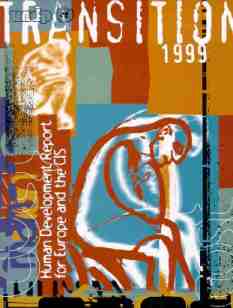Ukrainian Community Press Releases
| News
from and about Ukraine & Ukrainians
Ukrainian Community Press Releases |
New Report from UN Development Programme analyzes human dimension of transition
 |
|
Human Development Report for Central and Eastern Europe & the CIS http://www.undp.org/rbec/pubs/hdr99/
"Transition 1999 - Human Development Report for Central
and Eastern Europe and the CIS" is available through
United Nations
Publications. Visit their website on http://www.un.org/publications
or contact them via e-mail on publications@un.org.
|
New York , 29 July 1999 -- A troubled transition in ex-Soviet countries has meant a rise in poverty, crime, disease and mortality rates, according to a new report released by the UN Development Programme (UNDP). A human crisis of monumental proportions is emerging in the former Soviet Union, says “Transition 1999” a Human Development Report for Europe and the Commonwealth of Independent States. Those hardest hit are the men of the region, who are living shorter, more unhealthy lives.
The transition years “have literally been lethal for a great many people,” asserts the report. Most strikingly, the biggest single cost has been the loss of lives among young and middle-aged men. This is reflected in an abnormally low ratio of men to women in the total population, that is the difference between the number of men one would expect to find if the sex ratio were normal. According to the report there are nearly 5.9 million “missing men” in the Russian Federation alone and another 2.6 million in Ukraine. The total for the transition economies as a whole is nearly 9.7 million. The causes are multiple and complex including rising suicide rates, declining life expectancy, health care, and an increase in self-destructive behaviour.
Ten years after the fall of the Berlin Wall, the gains in political democracy are significant, but remain vulnerable to reversal. Widespread poverty and a growing gap between rich and poor in the countries of the former Soviet Union threaten human security.
“There is an urgent need to focus on the social fallout and inequalities that the transition has brought if we want to see the countries-in-transition turn into a success in the 21st century,” says Anton Kruiderink, director of UNDP’s Regional Bureau for Europe and the CIS region, in a foreword to the report.
The process of transition in the region has had huge human development costs, many of which remain unabated. The number of people living on an income of US$4 a day in the region has risen from four per cent in 1988 to 32 per cent in 1994. Recorded drug crimes increased fivefold in Russia between 1991-1996. Many diseases which could be contained by standard immunization programmes are re-emerging as a result of a crisis in the health care systems in most of the countries, among them: tuberculosis, polio and anemia.
Corruption has become a customary means of carrying out political and economic transactions, the report asserts. And the black market has become the only source of income for many of the region’s unemployed. The “shadow” economy makes up 25 per cent of GNP in Russian and as much as 40 per cent in Yugoslavia, Armenia and the Former Yugoslav Republic of Macedonia. Thus, a “shadow” economy is better than no economy, says the report, which is based on experiences from 23 country offices in Eastern Europe and former Soviet countries.
The report argues for an urgent shift from private consumption policies
to investment in people. "In pursuit of uniform economic policies to achieve
more efficient allocation of resources, free market mechanisms are vital,
but so are mechanisms concerning social equity," says Mr. Kruiderink. “Reforms
to build thriving, sustainable market economies will only succeed if built
on successful investments in people,” he says.
For more information and to obtain copies of “Transition 1999 - Europe
and CIS Human Development Report” contact: Ms. Kowkab Simaan at (212) 906-6734.
|